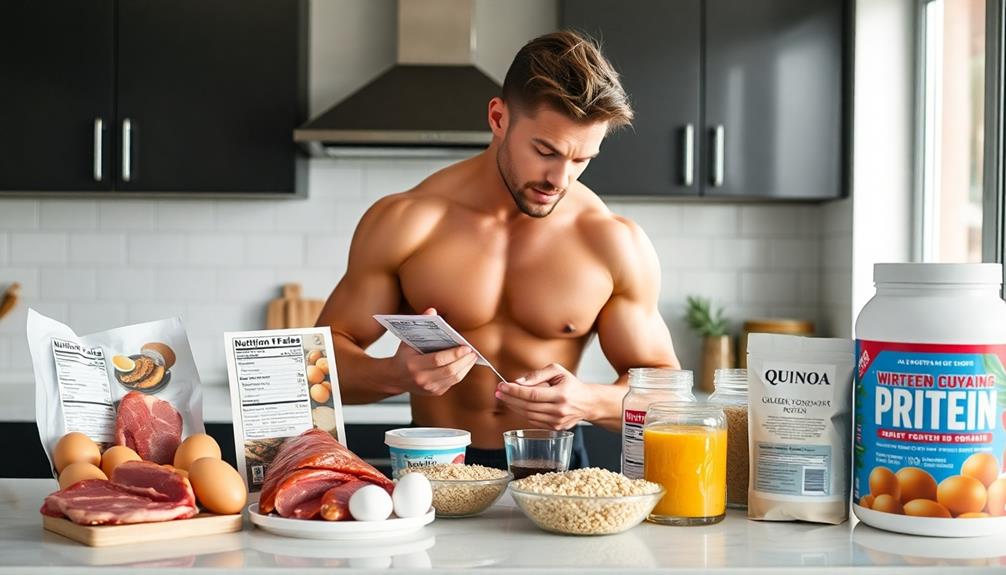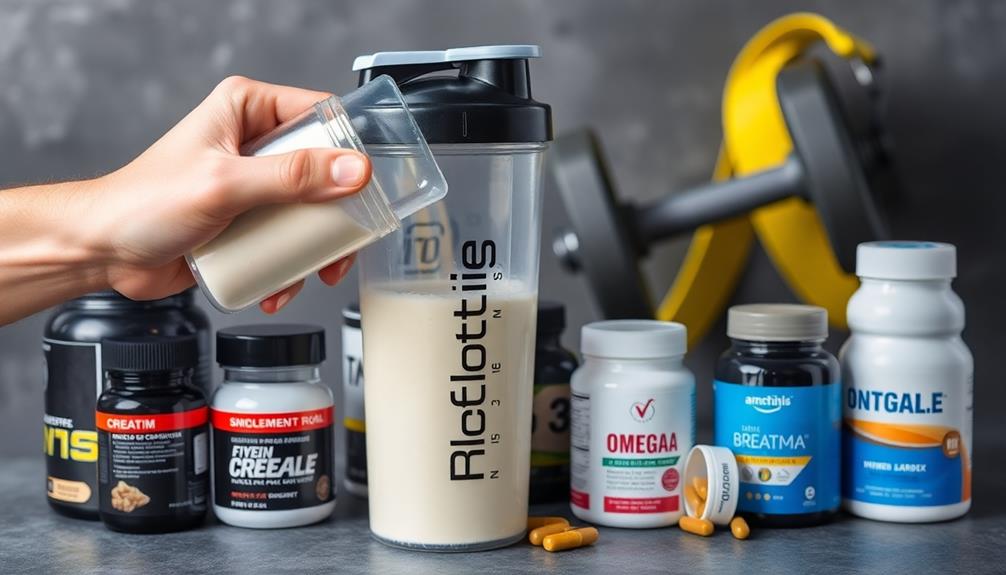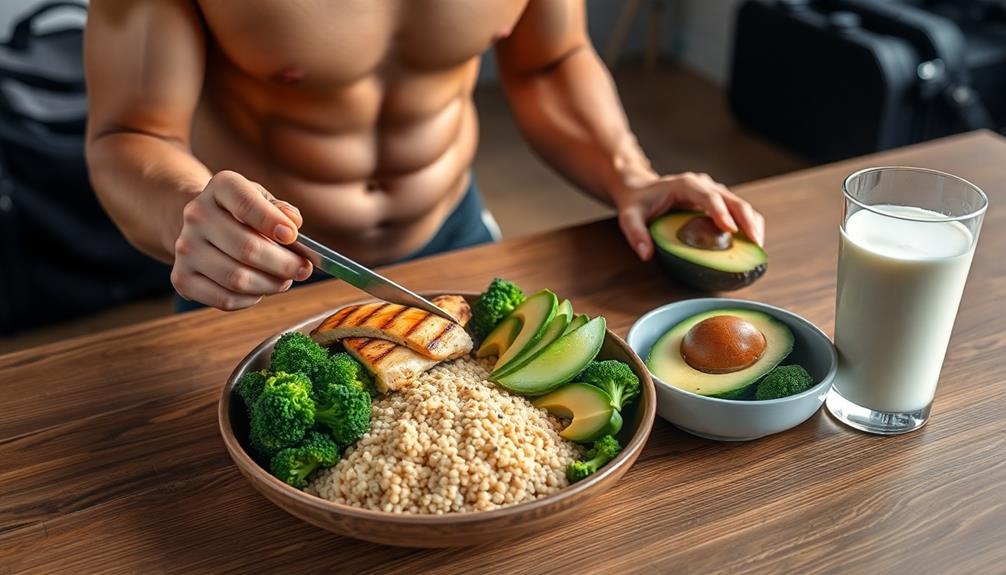To optimize protein intake after hypertrophy training, focus on these seven essential tips: Time your consumption within 30 minutes to 2 hours post-workout. Choose high-quality sources like lean meats, fish, and eggs. Incorporate protein shakes for quick absorption. Meal prep in advance to guarantee balanced, protein-rich meals. Supplement wisely with whey, casein, or plant-based powders. Balance your macronutrients effectively, aiming for a 40/30/30 ratio of carbs, protein, and fat. Track your intake using apps or journals to meet your daily protein goals. By implementing these strategies, you'll support muscle growth and recovery. Discover how these tips can revolutionize your post-workout nutrition routine.
Core Insight
- Consume 20-40 grams of high-quality protein within 30 minutes to 2 hours post-workout.
- Incorporate protein shakes with whey isolate or whey-casein mixes for quick absorption.
- Meal prep balanced meals with lean proteins, complex carbs, and vegetables for convenient post-workout nutrition.
- Balance macronutrients effectively, aiming for 30% of calories from protein to support muscle growth.
- Track daily protein intake using apps or journals to ensure consistent consumption throughout the day.
Timing Your Protein Consumption

Eating protein at the right times is key for building muscle after strength training. Try to eat protein within 30 minutes to 2 hours after your workout. This is when your muscles can best use the nutrients. Some muscle-building supplements have ingredients that may help with recovery, but check with your doctor first.
If you can't eat right after training, don't stress. The most important thing is getting enough protein throughout the entire day. Aim for 20-40 grams of protein at each meal or snack.
Choose High-Quality Protein Sources

When choosing proteins to build muscle, quality is just as important as quantity. Pick sources with all the essential amino acids, especially leucine, which is crucial for muscle growth. Good options are:
- Lean meats (chicken, turkey, lean beef)
- Fish (salmon, tuna, tilapia)
- Eggs and egg whites
If you want to get the most out of your protein, casein supplements can be a great addition. They digest slowly, giving your muscles a steady supply of amino acids for recovery and growth.
Don't forget about plant-based choices, which are perfect for vegetarians or vegans. Soy, quinoa, and combos of beans and grains can give you complete protein. Whey protein supplements are popular because they absorb fast and have lots of leucine. But casein is good before bed since it digests slower, feeding your muscles all night long.
Incorporate Protein Shakes

Protein shakes are a great way to boost your post-workout nutrition, even though whole foods should be your main protein source. They're easy to digest and quickly absorbed by your body, making them perfect for right after your workout. If you need help picking the right shake, check out a guide on protein shakes to find the best one for you.
When you're choosing a protein shake, go for whey protein isolate or a mix of whey and casein. These have all the amino acids your body needs and help your muscles recover and grow. You can mix the powder with water, milk, or a milk alternative to add more nutrients.
It's a good idea to make your shake ahead of time and take it with you to the gym. That way, you can refuel right after your workout. Aim for 20-30 grams of protein in your shake, depending on how much you weigh and how intense your workout was. Just remember, protein shakes shouldn't take the place of whole food meals – they should be part of your overall nutrition plan.
Meal Prep for Success

Planning your post-workout meals ahead of time can really boost your protein intake and help your muscles recover. When you meal prep, you'll always have high-protein foods ready to go after your muscle-building workouts. This saves you time and keeps your eating plan on track. Adding natural testosterone boosters to your meal prep can give your muscle growth an extra push. These ingredients help balance your hormones and make the most of your training.
Here's how to meal prep for post-workout protein:
- Cook lean proteins like chicken, fish, or tofu in big batches
- Make complex carbs like brown rice or quinoa ahead of time
- Pre-portion servings of veggies for extra nutrients
When meal prepping, create balanced meals with protein, carbs, and healthy fats. Keep your prepped meals in sealed containers in the fridge or freezer so you can easily grab a healthy option post-workout. If you meal prep right, you'll be all set to support your muscle gains and recovery.
Supplement Wisely

Supplements can boost your protein intake and help your muscles recover. Look for high-quality protein powders like whey, casein, or plant-based options. You can add them to shakes, smoothies, or oatmeal for extra protein. Choose post-workout supplements that support muscle recovery and growth. When you take your supplements matters too.
Creatine monohydrate is another good supplement for muscle growth and recovery. It's been well-studied and is safe for most people. BCAAs (branch-chain amino acids) can also help reduce muscle soreness and speed up recovery, especially if you take them during or right after your workout.
Balance Macronutrients Effectively

Balancing your protein, carbs, and fats is key for muscle growth and recovery. While protein helps build muscle, carbs give you energy and healthy fats support your hormones. Adding HMB supplements to your post-workout shake can boost muscle growth even more.
To get the right balance of macronutrients:
- Try to get 40% of calories from carbs, 30% from protein, and 30% from fat
- Change these amounts based on your goals and body type
- Have your biggest meals around your workouts for best results
Track Your Protein Intake

Tracking protein is key for building muscle after strength training. First, figure out how much protein you need daily based on your weight and how active you are. Use an app or journal to record all the food you eat, focusing on protein. Think about using natural protein powders, which offer complete protein and bonus ingredients like superfoods or probiotics.
Always read labels and measure portions for accuracy. Include protein from supplements too. Spread your protein throughout the day, with some right after workouts.
Check your logs often to spot trends and areas to improve. If you're not hitting your protein targets, add more high-protein foods or snacks. Stay consistent with tracking to reach your protein goals and get the best muscle gains.
Frequently Asked Questions
Can Vegetarians Meet Protein Requirements for Muscle Growth After Hypertrophy Training?
Yes, you can meet protein requirements as a vegetarian. You'll need to focus on plant-based proteins like legumes, tofu, seitan, and quinoa. Combine different sources to guarantee you're getting all essential amino acids for muscle growth.
How Does Age Affect Protein Absorption and Muscle Synthesis Post-Workout?
As you age, your body's protein absorption and muscle synthesis slow down. You'll need more protein and may take longer to recover post-workout. It's important to adjust your intake and timing to maximize muscle growth and recovery.
Are There Any Risks Associated With Consuming Too Much Protein?
Yes, you can consume too much protein. It's possible you'll experience digestive issues, dehydration, or kidney strain. Excessive intake may also lead to weight gain. It's best to stick to recommended amounts for your body and activity level.
How Does Sleep Quality Impact Protein Utilization for Muscle Recovery?
Your sleep quality greatly affects protein utilization for muscle recovery. When you're well-rested, your body efficiently processes and uses protein to repair and build muscle tissue. Poor sleep can hinder this process, slowing your recovery and gains.
Can Certain Medications Interfere With Protein Absorption After Hypertrophy Training?
Yes, certain medications can interfere with protein absorption after your workouts. You'll want to be cautious with NSAIDs, antibiotics, and some antacids. They may affect your gut's ability to absorb and utilize protein effectively.

